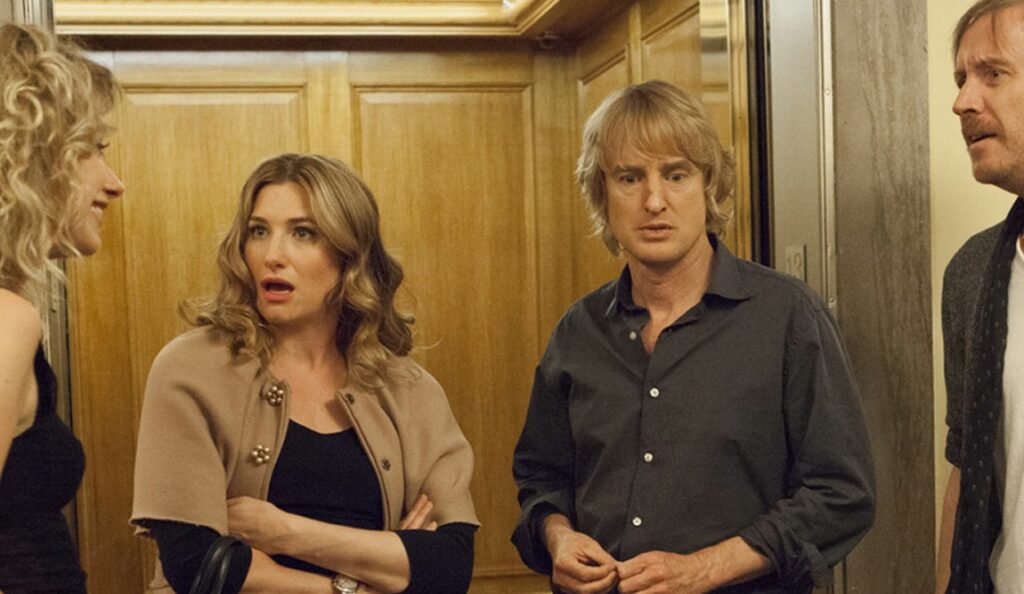Squirrels to the Nuts may not rise to the level of salvaged masterpiece, but it breezily reasserts the legacy and artistry of Peter Bogdanovich.
The rediscovery of Squirrels to the Nuts, Peter Bogdanovich’s original cut of the film that, under the title of She’s Funny That Way, became his final narrative feature, seems like something that could only happen in a Bogdanovich movie —an accident so happy as to feel like destiny, yet tinged with the inevitable melancholic feeling that it all may have come too late. Substantially re-shot and re-edited for a miniscule theatrical release, Squirrels is now showing in its original, slightly unfinished form at the Museum of Modern Art after a tape of the film found in a storage locker turned up on eBay (if only The Magnificent Ambersons or 4 Devils had the same luck). While Squirrels may not be a salvaged masterpiece on that level, it does represent something that feels just as rare in American cinema — a brilliant and committed artist further exploring the themes and obsessions that defined his career, with the utterly personal directness that so often comes from an auteur nearing the end of the line.
Though the two cuts differ significantly (the director’s runs about 20 minutes longer, for one thing), Squirrels to the Nuts and She’s Funny That Way do share the same basic story — the type of farce of coincidences and deceptions that Bogdanovich seemed to revive roughly once per decade. Acclaimed theater director Arnold Albertson (Owen Wilson), soon to begin work on a play starring his wife Delta (Kathryn Hahn) and her suspiciously friendly sex-symbol costar (Rhys Ifans), shares a tryst with call girl and aspiring actor Izzy (Imogen Poots), to whom he delivers a pre-packaged inspirational monologue lifted from another final film, Ernst Lubitch’s Cluny Brown (any fans of the movie will instantly know where Bogdanovich got his original title). After falling head over heels for Arnold that night, Izzy gets a call to audition for a play which, of course, turns out to be Arnold’s, and so begins a chain-reaction plot that draws in an elderly judge obsessed with Izzy (Austin Pendleton), the bumbling detective he’s hired to track her (George Morfogen), the playwright who also happens to be the detective’s son (Will Forte), and the hilariously uncaring psychiatrist to both Izzy and the judge, who also happens to be the playwright’s girlfriend (Jennifer Aniston, never better). The main point of divergence in Squirrels is the lack of the framing device that runs through the entirety of She’s Funny That Way, in which a now-Hollywood-famous Izzy recounts her story to a skeptical journalist played by Ileana Douglas (the granddaughter of a key Lubitsch player, of course). It’s the excision of this element in favor of a more relaxed, graceful construction that truly redefines Squirrels to the Nuts — Bogdanovich’s tribute to old Hollywood comes through not by way of glib meta-commentary, but by sincerely chasing the ecstatic comedic and emotional highs of its reference points.
Squirrels is undoubtedly an improvement on its theatrical version, though it’s not impossible to see what panicked the film’s producers so — the early stretches of the film are often stilted and unfunny, with Pendleton feeling particularly lost in the additional scenes afforded to him. There’s an undeniable tension between the classically stylized screenplay (by Bogdanovich and his wife Louise Stratten) and the movie’s flat digital images that puts his supposed old-fashioned tendencies into starker relief than ever, even more so than his deeply undervalued run of ‘90s features. It’s only when the various plot threads begin to coalesce that Bogdanovich’s cardinal virtues as a filmmaker — his balance between narrative precision and emotional fluidity, his generosity towards actors, and his winking, hard-won sincerity — really emerge. The payoffs come in two extended set pieces, one in a restaurant and the other in a hotel, that stand with some of the director’s finest work, while also operating as the best example of the theatrical influence reflected by the film’s plot. One of Bogdanovich’s familiar subjects here is how fictional construction leads to emotional truth, and the multiple roles his characters play on and off stage are vital to the film’s comedy as well as its drama.
The late career of Bogdanovich’s idol Howard Hawks is marked by films, like Hatari! and El Dorado, that recycle characters, situations, and themes from previous Hawks films, to the point of the latter being a full remake of one. Squirrels to the Nuts, similarly, feels much like a continuation of Bogdanovich’s 1981 masterpiece They All Laughed, from its musical-chairs plotting to its NYC-location shooting to its detective angle. The earlier film is a far richer emotional accounting for its characters’ and maker’s antics — let’s just say that Owen Wilson is no Ben Gazzara as far as Bogdanovich stand-ins are concerned — but the director’s dedication to his artistic principles 42 years after What’s Up, Doc’s poster asked “a screwball comedy — remember them?” is nearly as moving in its own right. Any case that still needs to be made for the artist’s original vision is sealed by the lovely final sequence, bafflingly cut to shreds in She’s Funny That Way, which caps off the romantic roundelays with as perfect a punchline to Bogdanovich’s career as one could hope for. Squirrels to the Nuts may be outmoded in style (and, admittedly, in attitude), but its pleasures are eternal, and worth celebrating — all the more so now that our current movie landscape seems committed to driving them extinct.
You can currently screen Peter Bogdanovich’s Squirrels to the Nuts at MOMA until April 5.


Comments are closed.